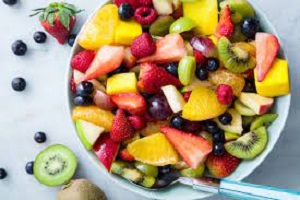Health Benefits of Fruit Salad – Is Fruit Salad Healthy?
Health Benefits of Fruit Salad – Is Fruit Salad Healthy?

A fruit salad is a dish composed of a variety of fruits. They are frequently offered as an appetizer or dessert.
Fruit salads come in an infinite variety of flavors, ranging from simple to somewhat sweet to sweet, depending on the toppings and syrups used.
They are also utilized for health purposes such as maintaining healthy vision, decreasing anemia, and so on.
They are more appealing since they include seasonal fruits.
Fruit Salad History
According to historians, fruit salads were particularly popular among the ancient Greeks and Romans.
Salads have become more complex over time, and there are now fruit salads in a variety of forms. Compote is one of the oldest fruit salads, dating back to the 17th century in England.
While ancient CHamorus ate papayas, mangoes, bananas, coconuts, and other natural fruits, the combination of fruits with a sweet sauce is uniquely Western.
The modern fruit salad (a combination of fresh fruits, canned fruits, and sugar) dates back to the mid-nineteenth century.
Fruit salads with mayonnaise are popular in Europe, oranges and sour cream in the United States, and coconut and condensed milk in the Philippines and Guam.
Toppings for fruit salads in the 1950s included canned fruit cocktails, sweetened mayonnaise, whipped cream, sweetened sour cream, or marshmallows.
On today’s celebratory table, blends of fresh and frozen fruits in their juices are presented without the addition of a sauce.
Nutritional Value
A bowl of fruit salad will often contain a variety of vitamins and minerals. The salad will often be high in vitamins A, B, C, and D. This is because the fruits are high in numerous vitamins.
Health Benefits of Fruit Salad
There is no right or wrong way to make a fruit salad, but a daily serving will give you various benefits and they include:
- Improves your immune system
According to research, fruits include components that help promote immune function, such as beta-carotene, vitamin C, and vitamin E. Many fruits are high in antioxidants, which help to reduce oxidative stress.
This antioxidant can reduce inflammation and improve immune function by strengthening disease-fighting cells in the body.
To improve immunity, citrus fruits, papaya, and kiwi can be included in fruit salads.
- Helps with Digestion
Many fruits are high in fiber, which aids digestion.
They also include important vitamins and minerals for digestion, such as vitamin C and potassium.
Apples, bananas, and oranges are excellent fruits for digestion.
- It aids in the prevention of heart disorders.
Fruits include antioxidants including vitamin C and beta-carotene. This slows or prevents atherosclerosis by reducing plaque deposition in the arteries caused by cholesterol.
Some heart-healthy fruits are apple, apricot, peach, banana, orange, and strawberry.
- Gives you healthy eyes
Antioxidants, vitamins A, E, and C, carotenoids, and beta carotene are all important for eye health. Regular exercise and a well-balanced diet are critical for overall health and the prevention of a number of eye illnesses.
Berries, bananas, mango, papaya, apricots, and citrus fruits all contribute significantly to eye health.
- Lowers the risk of anemia
Iron, vitamin C, and folic acid-rich foods are required for the synthesis of hemoglobin and red blood cells. This aids in the prevention and treatment of anemia.
A fruit salad with figs, pomegranate, orange, prunes, apples, apricots, and peaches is a nutritious dish that also helps with anemia management.
Other benefits include:
- Better digestion
- Fiber Abundance
- Folic acid content is high.
- High levels of energy
- Meets Your Daily Vitamin and Mineral Requirements
- Antioxidant Abundance
Healthy fruits and their nutritional Benefits
Strawberries Nutritional Benefits
They are a beautiful red heart fruit that has both sweet and tart flavors.
This fruit is high in vitamins C, folic acid, manganese, and potassium.
Strawberries’ strong antioxidant content benefits heart health and blood sugar management, as well as decreasing blood pressure and guarding against cancer.
Oranges Nutritional Benefits
The orange is one of the world’s most popular fruits. They provide a variety of nutritional and health benefits.
Other minerals, such as iron, can be better absorbed when oranges are added to fruit salads. Oranges are nutritious on their own.
They aid in the maintenance of a healthy immune system, the improvement of heart health, the management of blood pressure, the prevention of skin damage, and the relief of constipation.
Limes Nutritional Benefits
The tiny, round, yellow fruit is high in vitamin C, fiber, and a number of beneficial minerals.
They have a particular flavor that is sour, bitter, and sharp. They are typically used to enhance the flavor of other dishes rather than being consumed on their own.
This little but nutritious fruit has been linked to a number of health advantages, including weight loss, heart health, and digestion.
Grapefruit Nutritional Benefits
Grapefruit is a versatile citrus fruit that is both nutritious and delicious. They have both bitter and sour flavors, with the sourness being more prominent.
Grapefruit is well-known for its ability to reduce acidity, stimulate metabolism, aid in weight loss, and build bones.
Blackberries Nutritional Benefits
They are one of those wonderful berries. Blackberries are a superfood because they are high in fiber, vitamin C, K, and minerals like manganese.
Blackberries are beneficial to brain health, cognitive function, oral health, skin regeneration, vision, bone strength, cholesterol reduction, and cancer prevention.
Apples Nutritional Benefits
They are easy to find because they are accessible all year, making them an excellent choice for a fruit salad.
Apples are well-known for their antioxidant content; they also contain dietary fiber and flavonoids.
Apples include nutrients that can lower the risk of diseases such as diabetes, hypertension, and heart disease. Half an apple would be ideal for the ideal fruit salad.
It’s time to add something fresh to your fruit salad, and what better way than with an orange?
Pomegranate Nutritional Benefits
The crimson fruit with numerous little delectable seeds is high in iron, vitamins A, C, E, and folic acid.
Pomegranate helps to prevent atherosclerosis, arthritis, and heart disease, as well as lower blood pressure and boost memory and immunity.
Pineapple Nutritional Benefits
The pineapple is a tropical fruit with a sweet and acidic flavor. Their low-calorie content is an extra benefit.
Pineapples are high in vitamins and antioxidants, which assist to strengthen bones, boost the immune system, and aiding digestion.
Bananas Nutritional Benefits
Bananas are a popular fruit that comes in yellow, red, and green colors and has a high potassium and fiber content.
They also include a variety of other vital vitamins and minerals.
Banana benefits heart health, weight loss, bone health, cancer prevention, and depression relief.
Avocado Nutritional Benefits
Avocado is surely a popular fruit in recent years. They have a creamy texture and a nutty flavor.
Avocado is high in potassium, monounsaturated fatty acids (MUFA), folate, and fiber.
Avocado’s nutritional value assists the heart, bones, eyes, and brain. They help fight cancer, improve prostate health, and reduce blood sugar levels, in addition to being an excellent skincare element.
Blueberries’ Nutritional Benefits
They are a luscious berry with a great flavor.
Blueberries’ health benefits are attributable to the inclusion of minerals such as vitamin C, K, fiber, manganese, and potassium, as well as their low-fat level.
Blueberries have been shown to improve mood and memory, as well as to prevent urinary tract infections.
Skin Benefits of Fruit Salad
When we think about skincare, the first thing that comes to mind is probably the items that must be applied externally.
However, because what we eat affects our appearance, the beauty routine might begin in the kitchen.
A simple fruit salad is one of the healthiest meals to consume on a regular basis.
A fruit salad can work wonders if the right number and variety of fruits are ingested since it provides a potent dose of vitamins, fiber, and antioxidants.
Fruits’ antioxidant content protects the skin from free radical cellular damage. Free radicals, pollution, smoking, and sunlight can all contribute to wrinkles and age spots.
Vitamin C, which is found in many fruits, is also a potent antioxidant. It is required to improve the immune system, make the skin glow, and aid in the reduction of blemishes.
Collagen improves skin suppleness, reduces visible wrinkles, strengthens hair, and increases blood flow to the skin.
Fruit salads with collagen-boosting fruits can be advantageous.
Fruits that promote healthy skin and hair include kiwi, pineapple, guava, citrus fruits (orange, amla), and pomegranate.
Skin that glows
These vitamins and minerals make the skin seem beautiful, firm, and healthy by promoting collagen production.
Certain fruits have high levels of vitamin C and salicylic acid, which assist to keep the skin clear and free of blemishes. Additionally, ellagic acid helps to prevent collagen breakdown, UV damage to the skin, and the formation of wrinkles.
Avocado, orange, lemon, strawberry, pomegranate, papaya, apple, cucumber, tomato, and watermelon are regarded as the greatest fruits for enhancing the skin’s natural radiance.
Encourages Weight Loss
Fruits are an important part of a healthy diet. They are low in calories and high in fiber, making them an excellent weight loss option.
The fiber level also keeps the stomach fuller for longer, reducing the consumption of junk foods.
Fruits with a low Glycemic Index (GI) and Glycemic Load (GL) promote weight loss and maintenance.
Apples, oranges, melons, avocado, and kiwi are some fruits that can help you lose weight. These fruits can be added to a fruit salad for increased nutrition.
Fruit salad for a sunny day
We all require a diverse seasonal diet in order to obtain the optimal nutritional values to accommodate the changing seasons without becoming unwell.
Seasonal fruits can help us keep healthy as the seasons change since they are high in nutrients, vitamins, and minerals.
This assists our bodies in reaching their nutritional needs.
Fruit salads made with watermelon, muskmelon, lychee, grapes, mango, and jackfruit would be a refreshing summer dish. The high water content makes it ideal for rehydrating.
Fruit Salad Recipe ~ Fruit Salad Recipes
Ingredients:
- Watermelon
- Muskmelon
- Kiwi
- Grapes
- Mango
Steps
- Cut the materials into small pieces in the desired quantity.
- Combine the ingredients in a mixing bowl.
- If desired, add honey and lime juice.
- The summer fruit salad is ready to go.
Fruit Salad Dressing
Salad sauces are frequently referred to as dressings. Salad dressings are classified into three categories in Western culture.
- Vinaigrette is a salad oil and vinegar emulsion that is commonly seasoned with herbs, spices, salt, pepper, sugar, and other components.
- Creamy dressings, are typically mayonnaise-based but include yogurt, sour cream, buttermilk, or milk. • Cooked dressings, which are similar to creamy dressings, are typically thickened by adding egg yolks and gently boiling them.
Precautions and Guidelines
Even if a cup of fruit salad has numerous benefits, there are some precautions and guidelines that should be followed. Consider the following advice before consuming salad fruit on a daily basis:
- Some fruits may be considered sour. As a result, it is advised to eat the salad in suitable portions because it may cause diarrhea in certain people.
- The fruit may also produce allergic reactions such as redness, irritation, or even sickness and nausea.
As a result, avoid eating fruits that cause allergies. It is preferable to substitute safe foods such as apple or papaya, which are often accepted by all people.
- Pregnant women should be cautious when selecting fruit. Because certain fruits, such as pineapple, might cause miscarriage.
- People with a variety of medical conditions must make careful eating choices. Because some fruits, such as sweet longan or star fruit, might cause diabetes and lower blood pressure.
These are the health advantages of fruit salad. Consuming salad on a daily basis is beneficial to one’s health.
As a result, make it a healthy habit.
This can be used as a meal substitute during a diet. It can also be a delectable treat for children.
In the end, it benefits everyone, whether they are youngsters or the old.
Conclusion
Aside from being delicious, fruit salads are a nutritious snack. They are ideal for a summer meal.
Fruit salads come in a variety of flavors and can be customized based on personal tastes and seasonal availability.
Fruit salads, being high in nutrients, provide several health benefits as well as benefits to the skin and hair, malignancies as well as anti-aging properties
FAQs
Is it healthful to eat a fruit salad every day?
A simple fruit salad is undoubtedly one of the healthiest meals to eat on a daily basis.
A fruit salad can work wonders if the right number and variety of fruits are used, providing a potent dose of vitamins, fiber, and antioxidants.
How do you prepare an excellent fruit salad?
An excellent fruit salad is created using a variety of seasonal fruits, topped with nuts and honey if desired.
Personal favorites can also be included.
Why is fruit salad healthy?
Fruit salads help you lose weight, have great skin and hair, strengthen your immune system, ease digestion, avoid heart disease, and treat anemia since they are high in fiber, antioxidants, vitamins, and minerals.
Which fruit salad is the healthiest?
The healthiest fruit salad is created from fresh seasonal fruits with no added flavors or sugar.
Is homemade fruit salad healthy?
Yes! Fruit salads are nutritious when made fresh at home with no added sugar.
Are fruit salads healthy?
Fruit salads are a nutritious food for the body since they contain vitamins, minerals, fiber, and antioxidants.
What is the greatest fruit for bright skin?
Fruits that make the skin glow include orange, lemon, avocado, strawberry, pomegranate, papaya, cucumber, tomato, and watermelon.
Is it healthy to eat fruit salad every day?
A simple bowl of fruit salad may be one of the healthiest meals you consume on a daily basis.
A fruit salad can perform wonders for you if you use the proper amount and variety of fruits, as it will offer you a power-packed dose of fiber, vitamins, and antioxidants.
What nutrients are abundant in fruit salad?
Fruits contain essential nutrients such as vitamin A, vitamin C, potassium, and fiber. They also have reduced calorie, fat, and salt content.
What are the advantages of eating a variety of fruits?
Consuming some vegetables and fruits as part of a healthy diet may protect against certain types of cancer.
Including fruit can help increase fiber and potassium intake, which are vital nutrients that many Americans do not receive enough of.
Is fruit salad a healthy dinner option?
Fruit salad is a healthful side dish that is high in fiber, vitamins, and nutrients that can be served at almost any event.
Is fruit salad a nutritious breakfast?
Fruit salad is an excellent choice for breakfast because it is high in vitamins and nutrients.
There are many possibilities for what to use in your fruit salad.
Bananas are high in potassium, which is essential for keeping healthy blood pressure and muscles.
Is fruit salad with milk nutritious?
Milk is an animal protein that, when combined with some fruits, can induce digestive difficulties, acidity, and fermentation in the gastrointestinal tract.
Can fruit salad be considered a meal?
Fruit salad isn’t simply for dessert or as a snack in the afternoon.
This spicy and sweet fruit salad is ideal for summer evenings on the patio.
What Should You Serve With Fruit Salad?
- Grilled Marinated Chicken
- Creamy Macaroni and Cheese
- Peanut Butter Cookies
- BBQ Rubbed Pork Chops and Peaches
- Maple Barbecue Chicken Wings
- Homemade Croutons
- Baked Omelette with Tomatoes and Onions
Is it true that lemon juice keeps fruit salad fresh?
Lemon juice, as a natural antioxidant, can help your fruit salad last longer (as well as its aesthetic appeal).
“The acidity of lemons helps to avoid browning of fruits,” explains Keri Gans, MS, RDN, CDN, a registered dietitian nutritionist.
How does a fruit salad diet work?
Make this simple fruit salad as a snack, dessert, or side dish.
Recipe for Fruit Salad:
- 1 cup halved strawberries
- 1 pitted and sliced the peach into bite-sized bits
- 1 peeled and cut kiwi into bite-sized portions
- 4 cups blueberries
- 5 cups raspberries
- 6 cups grapes
- 7 cups watermelon, sliced into bite-size bits
What is the best way to create a simple fruit salad?
In a small mixing bowl, combine honey, orange juice, and lemon zest.
Toss the fruit in a large mixing dish with the dressing, swirling gently to incorporate. Refrigerate until ready to serve.
How do you keep fruit salad from browning?
Coat them in an acidic juice like lemon, orange, or pineapple juice.
Combine them with acidic fruits such as oranges, tangerines, grapefruit, and other citrus fruits, as well as pineapple.
What is the best way to create a simple fruit salad?
In a small mixing bowl, combine honey, orange juice, and lemon zest. Toss the fruit in a large mixing dish with the dressing, swirling gently to incorporate. Refrigerate until ready to serve.
What exactly is in a fruit salad?
Strawberries, pineapple, honeydew, watermelon, grapes, and kiwifruit are common ingredients in fruit salads.
Various recipes may include nuts, fruit juices, specific veggies, yogurt, or other elements.
How do you make a healthy fruit salad with yogurt?
Instructions
- Firstly, combine the prepped fruit in a large mixing bowl,
- Then, to protect the fruit from browning, gently stir with lime juice.
- After that, combine yogurt, lemon juice, honey, and vanilla extract in a separate small bowl,
- Meanwhile, combine the yogurt mixture with the prepared fruit.
- Lastly, mix until well blended.


